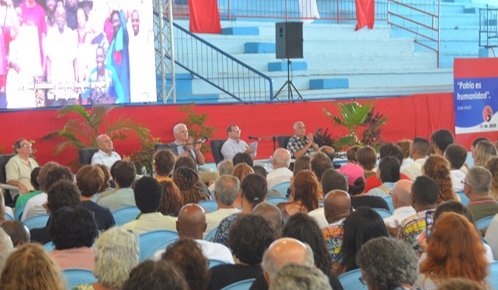
The event is taking place as part of the commemorative activities for the
72nd anniversary of the assault on the Moncada and Carlos Manuel de Céspedes barracks.
Photo: Frank Aparicio de la O
Ciego de Avila, July 25 (RHC)-- "Cuba will not surrender because the people will not betray their history, nor the legacy of their heroes and martyrs, nor the trust and hope you place in them and their example," said Miguel Díaz-Canel, first secretary of the Central Committee of the Communist Party of Cuba (PCC) and president of the Republic, this Friday in Ciego de Ávila.
The dignitary presided over a Solidarity Meeting in the Giraldo Córdova Cardín covered hall, with the participation of 370 friends representing 23 countries, organized into eight solidarity projects from Latin America and the Caribbean, Africa, Europe, and the United States.
The event is held as part of the commemorative activities for the 72nd anniversary of the assault on the Moncada and Carlos Manuel de Céspedes barracks, for which the province of Ciego de Ávila is the venue for the central national event.
Several voices were raised in support of the Cuban Revolution, including that of Samira Addrey, an American graduate of the Latin American School of Medicine (ELAM), who said that thanks to her profession and those who trained her, she learned not only to heal bodies but also to love those in pain.
Addrey described the media and political campaigns of the United States government against the medical cooperation of the largest island in the Antilles abroad as unfounded and cowardly.
For his part, Fabiano Salazar, a member of the Brazilian Movement of Solidarity with Cuba, demanded an end to the economic, commercial, and financial blockade imposed by the United States on the country and its removal from the list of alleged sponsors of terrorism.
"Based on a revolutionary ethic, we are committed to Cuba and to the fight for its causes, which are the just causes of humanity," said Oihana Vicente, a representative of Sortu, a Basque party.
Oihana exemplified how, from their positions, they are working to counter the media fight against Cuba and promote the truth about its people in Europe.
Addressing those present, the head of state evoked the legacy of the historic leader of the Revolution, Fidel Castro Ruz (1926-2016), in the way Cuba has resisted the attacks of imperialism, thanks in part to global solidarity.
Regarding the country's current situation, Díaz-Canel said that the US policy of suffocating the island is different, having intensified since Donald Trump's first term (2017-2021), based on a series of measures, including the implementation of Title III of the Helms-Buton Act.
The Cuban president commented that a medium- and long-term strategy has been prepared to overcome the blockade, even if it becomes even more stringent. At the meeting, several people referred to the genocide carried out by Israel against Palestine in the Gaza Strip and the need for the world to unite to provide a stronger response to these crimes.
Cuba not only reaffirms its political anti-imperialism on international stages, but also welcomes young people from that Middle Eastern nation for medical training.
Accompanying the Cuban leader and friends from around the world were Roberto Morales Ojeda, Secretary of Organization of the Central Committee of the Communist Party of Cuba; Bruno Rodríguez Parrilla, Minister of Foreign Affairs; Emilio Lozada García, head of the Department of International Relations of the Party Central Committee; Fernando González Llort, president of the Cuban Institute of Friendship with the Peoples (ICAP); and Julio Gómez Casanova, First Secretary of the PCC in Ciego de Ávila.
[ SOURCE: ACN and PRENSA LATINA ]

